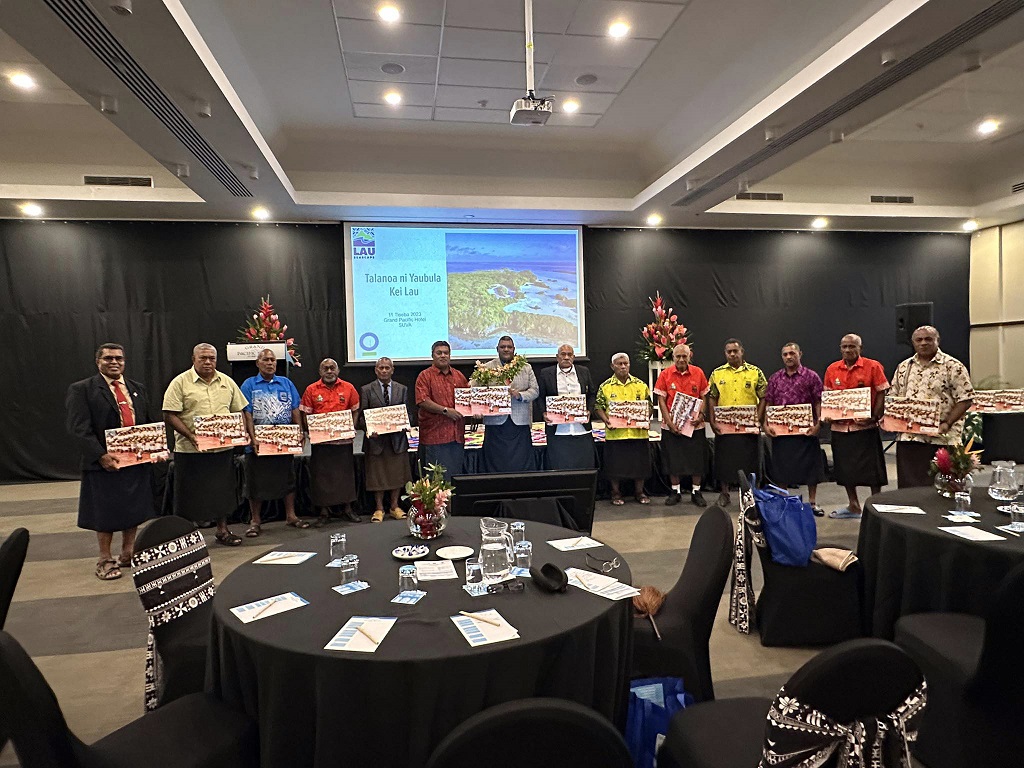Conservation International Fiji hosted a workshop for the province of Lau for further discussion on the protection of the Lau seascape resources.
The Lau Seascape is an initiative to protect the ecosystems of Fiji’s Lau island chain.
Designed in 2016 by Conservation International with the support of the 30 Lau Island chiefs, the initiative aims to ensure sustainable management through a “ridge-to-reef-to-ocean” approach that encompasses all the region’s ecosystems.
The Seascape – in partnership with the Fiji Locally Managed Marine Area Network, Pacific Blue Foundation, and the Lau Provincial Council – hopes to foster local stewardship and build local capacity to support effective co-management between the Lau communities and the government. In order to better manage the tradeoffs between biodiversity and food security, the initiative carefully accounts for local traditions and culture.
Assistant Minister for iTaukei Affairs, Isikeli Tuiwailevu, was the chief guest at the workshop and he praised the province of Lau for such a project.
“The chiefs of Lau, together with their communities, have shown remarkable commitment not only to environmental protection but also to revitalising social and cultural values, which are integral to the identity and heritage of our community,” he said.
The minister expressed enthusiasm for the ongoing implementation of the Lau Seascape Strategy, particularly its role in shaping Fiji’s national plans to achieve Sustainable Development Goals and the 30 X 30 national Marine Protection goal.
He also said the workshop was a good opportunity to look back at how far the province has come working with Conservation International for its Seascape project since its launch in 2016.
Conservation International senior marine program manager, Semisi Meo, said they have set huge plans for the province of Lau.
“In the near future, with talks and approval with the different chiefs from Lau we might look to develop eco-tourism” he said.
Mr Meo said it was important to conserve our natural resources as our carelessness could impact the environment, resulting in global warming.
The workshop at the Grand Pacific Hotel highlighted the Lau Seascape sustainable development model, focusing on environmental, social, and economic safeguards, balancing protection and production for current and future generations.
Fiji has opted to have 30 per cent of its marine life and environment conserved, and 8.26 per cent alone is from the Lau province.
The event brought together a diverse group of stakeholders, including traditional leaders, government representatives, NGOs, Yaubula management practitioners, academics, and the private sector.
Discussions focused on integrating the Lau Seascape Initiative’s objectives with national conservation commitments and governance frameworks.
Conservation International vice president pacific island oceans program, Susana Tuisese, said that the villagers have been working together with their team.
“In terms of engagement, it has been very good” she said. In conjunction with the symposium, a special picture book was launched, capturing the essence of the Lau Yaubula Festival.
This festival, which brought together 13 tikina from Lau in June 2023, vividly showcased their traditional culture and practices.
The book serves as a visual story of the Lau Seascape Strategy, illustrating the deep interconnection between nature preservation and cultural heritage.



